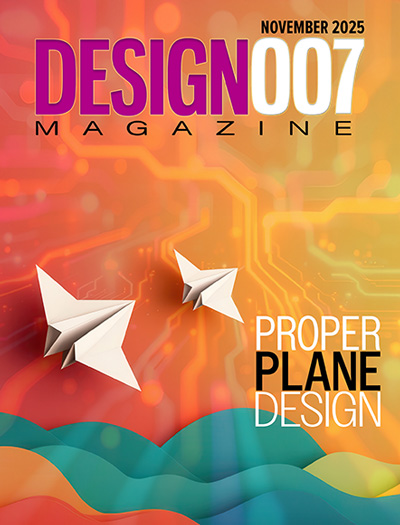-

- News
- Books
Featured Books
- design007 Magazine
Latest Issues
Current Issue
Designing Proper Planes
Without planes, designers would have to create thousands of traces to accomplish the same objectives. Power planes provide low impedance and stable power, and ground planes stabilize reference voltage, improve thermal performance, and help preclude EMI issues.

Power Integrity
Current power demands are increasing, especially with AI, 5G, and EV chips. This month, our experts share “watt’s up” with power integrity, from planning and layout through measurement and manufacturing.

Signal Integrity
If you don’t have signal integrity problems now, you will eventually. This month, our expert contributors share a variety of SI techniques that can help designers avoid ground bounce, crosstalk, parasitic issues, and much more.
- Articles
- Columns
- Links
- Media kit
||| MENU - design007 Magazine
Embedding Know-how Into Automation
April 6, 2023 | Barry Matties, I-Connect007Estimated reading time: 2 minutes
Michael Ford, senior director of emerging industry strategy for Aegis Software, speaks with Barry Matties on the topic of tribal knowledge, its pros and cons, and its role in our industry. While it may be useful if your team never changes, the inevitability of a person’s career progression means they take their knowledge with them. Michael brings his nuanced perspective to the conversation.
Michael, is tribal knowledge a friend or foe? What’s your initial reaction?
My initial reaction is that tribal knowledge is definitely a foe.
Why do you say that?
Manufacturing has long been dependent on a significant amount of legacy skills. These have accumulated over many years as we’ve gained experience and know-how across various technical areas of operations. But as our experts grow older, the younger people coming in behind them don’t have the opportunity to gain that same experience first-hand. We are, therefore, destined to lose the experience and know-how unless we can capture it somehow. Manufacturing cannot be sustainable if it continues to be dependent on that tribal knowledge.
Short of downloading somebody’s experience into a computer, and transferring it to another person, the more practical approach is to represent that know-how within software associated with machines and software solutions. Automation technology is developed using that know-how, so that key manufacturing dependencies on specific people are avoided. The value from that experience is easily realized in their choices of machines and software tools.
What I’m hearing is that tribal knowledge is valuable, but it will fade away unless we capture it.
There is a simple, but unfortunate pattern that emerges when we try to transfer knowledge from one person to another. Initially, you train someone to perform a certain role, and over time, they become absolute experts in what they do. The time comes, however, for them to move on. Everyone likes the opportunity for career progression. Their replacement must be trained. Will 100% of their knowledge and experience be transferred? No.
Some of that knowledge may not even be valid today, and that’s where it gets tricky.
The priority is always to transfer the part of the knowledge that is in use, relevant to the current operation, which represents a fraction of their total knowledge. The same cycle then repeats, reducing the amount of knowledge and know-how overall. This is a natural process, as there is limited time in which to do those transitions. The worst part is that the operation appears to be operating as required but is actually becoming totally inflexible. Those performing their tasks know less and less about why they’re doing it. They are only doing what they’ve been told and are not confident to deviate from that operation in any way because they don’t know the reasons behind the tasks. Inflexibility breeds inefficiency, because where there needs to be change and evolution in the way that things are done, the ability to adapt and optimize are simply no longer there.
To read this entire conversation, which appeared in the March 2023 issue of Design007 Magazine, click here.
Testimonial
"Our marketing partnership with I-Connect007 is already delivering. Just a day after our press release went live, we received a direct inquiry about our updated products!"
Rachael Temple - AlltematedSuggested Items
Siemens, NEC Collaborate to Accelerate Smart Factory Innovation
11/06/2025 | SiemensSiemens Digital Industries Software announced that it has signed a Technology Partner Program Agreement with NEC to expand global solutions in the field of robot 3D simulation.
AV, OpenJAUS Announce Collaboration for Autonomous Uncrewed System (UxS) Interoperability
10/31/2025 | BUSINESS WIREAeroVironment, Inc. (AV), a global defense technology leader delivering software-enabled disruptive autonomous systems, announced a collaboration with OpenJAUS, LLC., a leader in middleware software solutions for unmanned and robotic systems, to integrate the JAUS standard into AV_Halo™ Command, a first-of-its-kind cross-architecture software solution for controlling uncrewed systems (UxS).
Aegis Software Expands its Presence in France and Partners with STPGroup
10/24/2025 | Aegis SoftwareAegis Software a global provider of manufacturing execution and operations software for diverse manufacturing industries, announced that it has signed a partnership with STPGroup to expand its support of the French electronics market. STPGroup, specializes in the distribution, manufacture and integration of industrial production equipment, and will become a representative of Aegis’ FactoryLogix MES Platform in France.
eInfochips, NXP Announce Collaboration Focused on Global Distribution and Customer Services
10/23/2025 | PRNewswireeInfochips, an Arrow Electronics company, and a leading provider of product engineering services, and NXP® Semiconductors, the trusted partner for innovative solutions in the automotive market, announced a multi-year collaboration focused on software distribution and customer services.
Simplifying Software Integration for Every Factory
10/22/2025 | Nolan Johnson, SMT007 MagazineAs a leading provider of factory digitalization solutions for electronics manufacturers, Cogiscan is at the heart of the software integration process. Davina McDonnell, director of marketing and product management, discusses how Cogiscan ensures that customers are ready to integrate and what it looks for to ensure a quick and appropriate installation.


